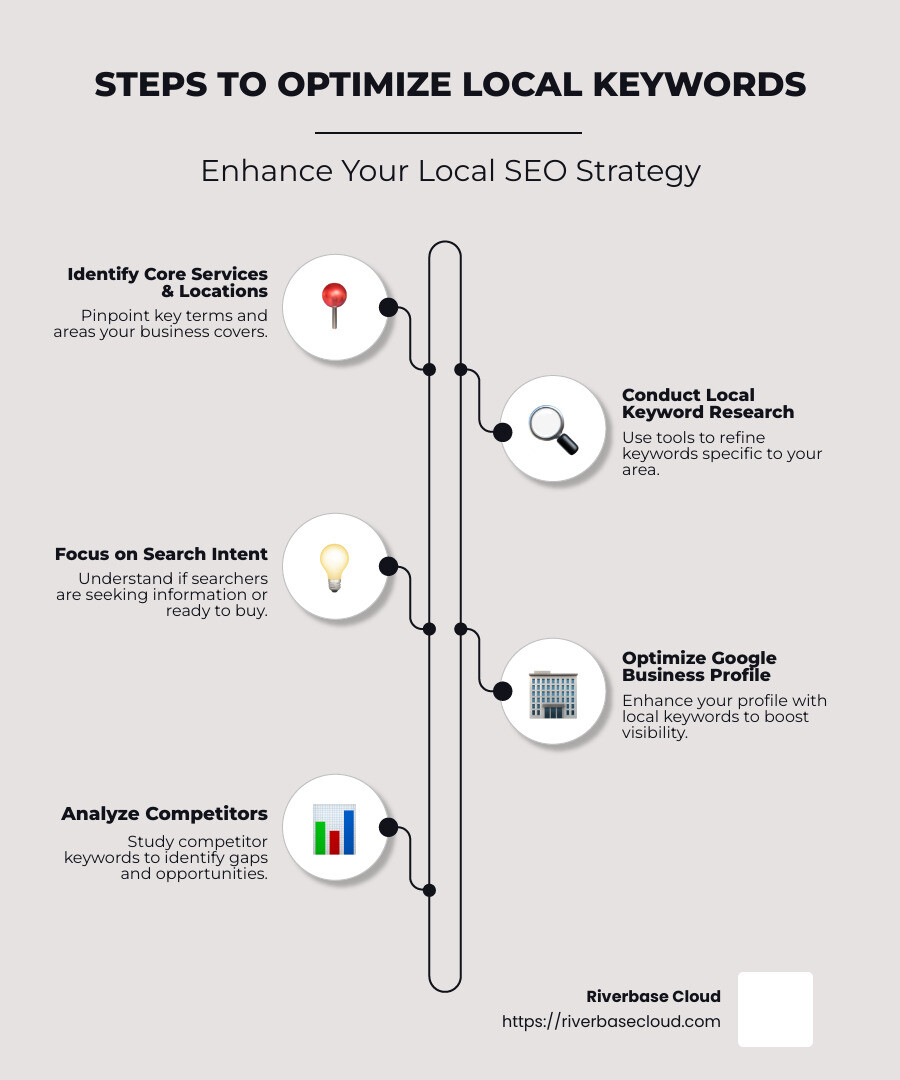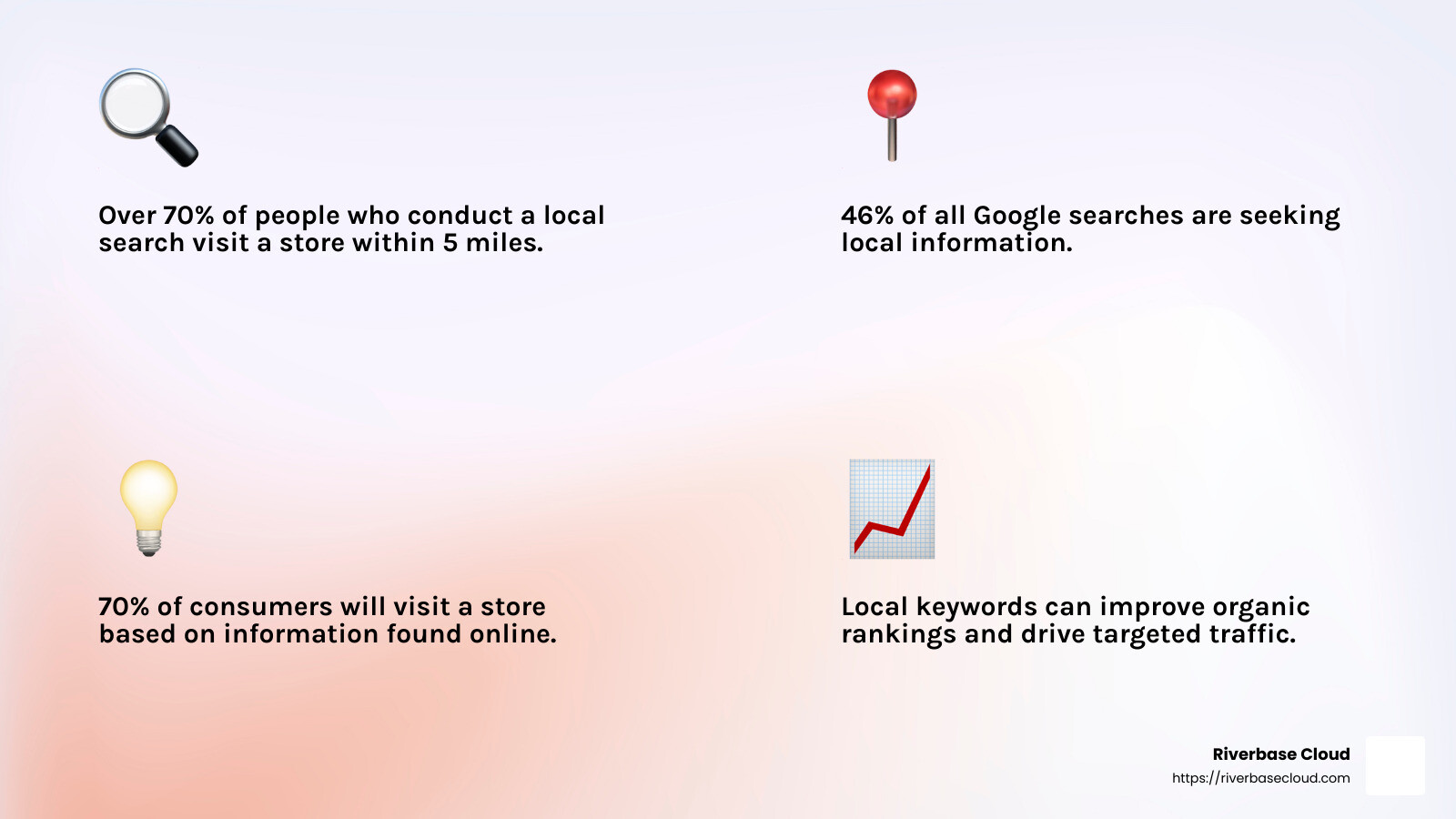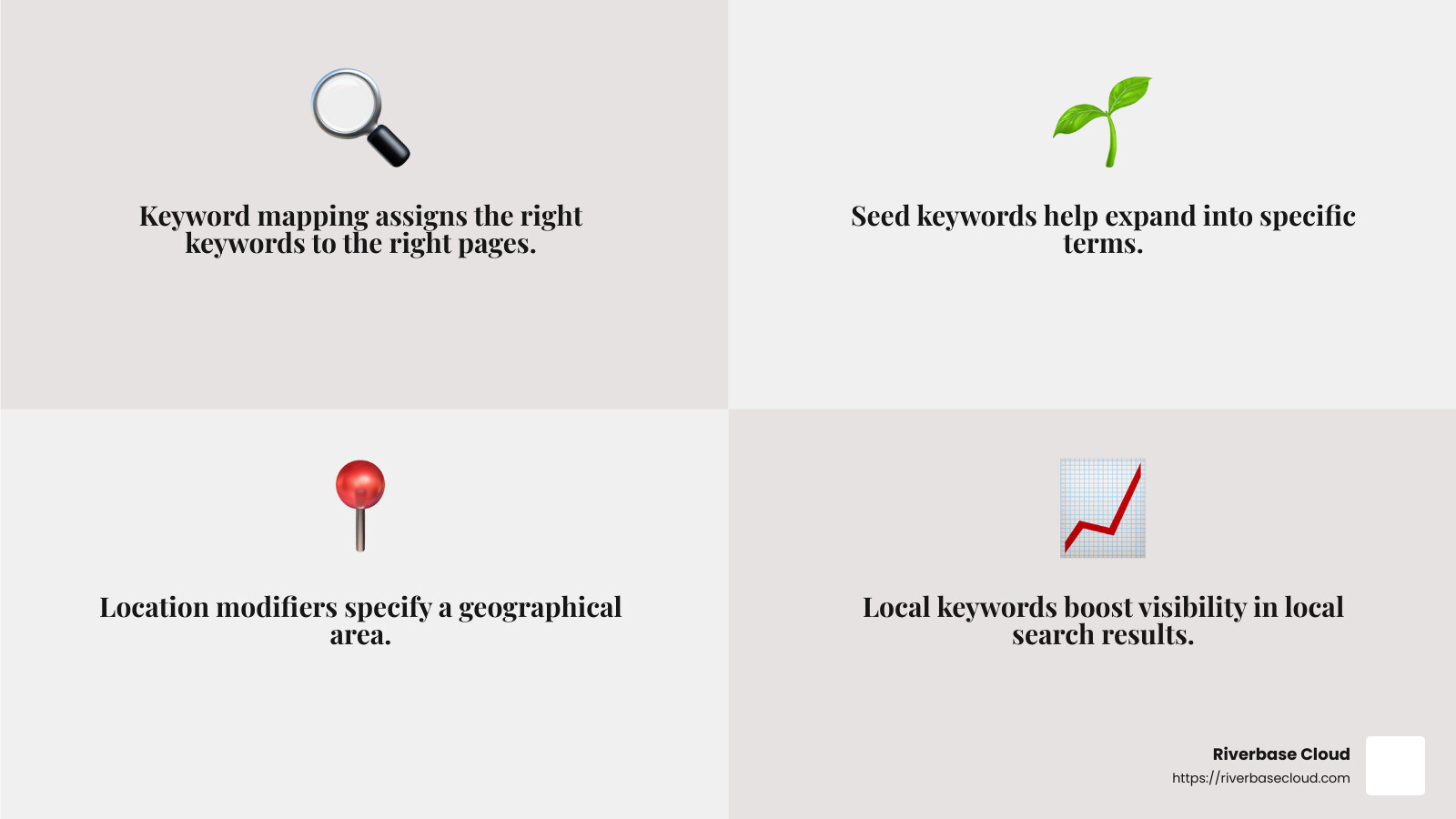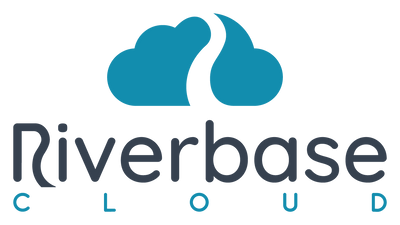Local keyword optimization is a crucial strategy for any business looking to improve its online presence within a specific geographical area. By honing in on region-specific keywords, your business can appear in local search results that matter most to your target audience. Here's the quick rundown:
- Identify your core services and locations: Pinpoint the key terms and areas your business covers.
- Use local keyword tools: Tools like Google Keyword Planner or Semrush can help refine these keywords.
- Focus on intent: Understand whether searchers are looking for information, ready to buy, or seeking specific businesses.
Imagine a local bakery seeing a 150% increase in search traffic after optimizing their Google Business Profile with local keywords. This demonstrates the real-world impact of strategic keyword use custom specifically to local search audiences.
As a seasoned expert in local keyword optimization, I’m Gary Gilkison, with years of hands-on experience helping businesses maneuver through the complexities of local SEO. I've helped numerous enterprises improve their search presence and drive high-quality leads using effective, data-driven strategies.

Key local keyword optimization vocabulary:
- local business promotion
- Google ranking optimization
- SEO for professional services
Understanding Local Keyword Optimization
Local keyword optimization is all about making sure your business pops up when people search for services in your area. Let's break it down into three key aspects: local keyword research, implicit vs. explicit keywords, and search intent.
Local Keyword Research
Local keyword research is the foundation of your strategy. It involves finding the words and phrases people use when searching for products or services in your area. This step is crucial because it helps you understand what potential customers are looking for.
For example, if you run a bakery in Miami, you might start with general terms like "bakery" and add location-specific modifiers like "in Miami" or "near South Beach." Using tools like Semrush or Google Keyword Planner can help you find these keywords and assess their search volume and difficulty.
Implicit vs. Explicit Keywords
When people search online, they often have local intent, even if they don't say it directly. This leads us to implicit and explicit local keywords.
Explicit local keywords include a location or spatial term. For instance, "bakery in Miami" or "Italian restaurant near me." These searches clearly indicate the user wants local results.
Implicit local keywords don't mention a location, but the intent is still local. If someone searches for "bakery," Google often assumes they want nearby results. This is because Google uses your IP address and other signals to guess your location.
Understanding both types of keywords is essential for a well-rounded local SEO strategy. You want to optimize for both explicit and implicit searches to cover all bases.
Search Intent
Search intent refers to the reason behind a user's search. Are they looking for information, ready to make a purchase, or just browsing?
Understanding search intent helps you craft content that meets your audience's needs. For example, if someone searches for "best bakery in Miami," they might be comparing options and looking for reviews. In contrast, "buy cupcakes in Miami" suggests they are ready to make a purchase.
By aligning your content with the search intent, you can improve user satisfaction and increase your chances of ranking higher in search results.

In summary, mastering local keyword optimization involves understanding the language of your local audience and aligning your strategy with their needs and intents. This ensures your business is visible when it matters most, driving more traffic and potential customers your way.
Next, we'll explore the steps to optimize local keywords effectively.
Steps to Optimize Local Keywords
Optimizing local keywords involves a few strategic steps to ensure your business gets noticed by the right audience. Let's explore how you can effectively map keywords, use seed keywords, and apply location modifiers.
Keyword Mapping
Keyword mapping is about assigning the right keywords to the right pages on your website. Each page should focus on a unique topic or service to avoid confusing search engines.
Imagine you own a chain of bicycle shops in different cities. You'd want to create separate pages for each location, like "Bike Repairs in London" and "Bike Rentals in Birmingham." This way, each page targets a specific set of local keywords, making it clear to search engines which page to show for each search query.
Mapping your keywords correctly ensures that your pages are relevant and valuable to users searching for local services.
Seed Keywords
Seed keywords are the starting point of your keyword research. They are broad terms related to your business. For example, if you run a coffee shop, "coffee" and "café" would be your seed keywords.
Once you have your seed keywords, you can expand them to find more specific terms. This is where tools like Google Keyword Planner come in handy. They help you find related keywords that people are actually searching for.
By starting with broad seed keywords and narrowing them down, you can build a comprehensive list of keywords that are relevant to your business and location.
Location Modifiers
Location modifiers are words or phrases that specify a geographical area. They transform generic keywords into local ones. For instance, "coffee shop" becomes "coffee shop in San Francisco."
Using location modifiers is crucial because they help attract users who are specifically looking for services in your area. It also reduces competition since you're targeting a more specific audience.
To find effective location modifiers, think about the areas you serve. Consider using city names, neighborhoods, or even well-known landmarks. For example, "near the Golden Gate Bridge" can be an effective modifier for a San Francisco-based business.
Incorporating location modifiers into your keyword strategy ensures that your business appears in local search results, connecting you with potential customers in your area.

By following these steps, you can effectively optimize your local keywords and boost your business's visibility in local search results. Next, we'll explore the tools that can help you refine your local keyword optimization strategy.
Tools for Local Keyword Optimization
When it comes to local keyword optimization, having the right tools in your toolkit is crucial. They help you find the best keywords to target and assess their potential impact. Let's look at some of the must-have tools for this process.
Semrush
Semrush is a powerful tool for keyword research. It's like having a digital detective that digs deep into the web to find the best keywords for your business. With its Keyword Magic Tool, you can enter a seed keyword and get a list of related terms. This tool also provides important data like search volume and keyword difficulty.
Keyword difficulty is a measure of how hard it is to rank for a specific term. Semrush's Keyword Magic Tool gives you a percentage score, helping you decide which keywords are worth targeting. Aim for keywords with a lower difficulty score but decent search volume to maximize your chances of ranking.
Semrush also offers a Competitor Analysis feature. You can see what keywords your competitors are ranking for and find gaps you can exploit. This is called a keyword gap analysis, and it's a great way to find opportunities you might have missed.
Google Keyword Planner
Google Keyword Planner is another essential tool for local keyword optimization. It's free and integrates seamlessly with Google Ads. This tool provides insights into search volumes and competition levels for different keywords. It's especially useful for finding location-specific keywords.
With Google Keyword Planner, you can filter results by geographic location. This means you can see how often people search for terms in specific areas, like "pizza delivery in Chicago." This local insight is invaluable for tailoring your SEO strategy to your target audience.
One limitation of Google Keyword Planner is that it often provides ranges instead of exact numbers for search volumes. But its integration with Google Ads makes it a go-to choice for those running ad campaigns alongside their SEO efforts.
Balancing Search Volume and Keyword Difficulty
When optimizing local keywords, it's important to balance search volume with keyword difficulty. High search volume keywords are tempting, but they often come with fierce competition. On the other hand, low difficulty keywords might not bring much traffic.
The key is to find a sweet spot: keywords that have a manageable difficulty and enough search volume to make an impact. Tools like Semrush and Google Keyword Planner provide the data you need to make these decisions.
By leveraging these tools, you can build a robust local keyword strategy that improves your online presence. Next, we'll dive into how to analyze your competitors to gain an edge in local SEO.
Competitor Analysis for Local SEO
Understanding what your competitors are doing is like getting a sneak peek into their playbook. Competitor analysis can give you insights into their strategies and help you find opportunities to improve your own local keyword optimization.
Competitor Keywords
Start by identifying the keywords your competitors are targeting. This can give you an idea of what works in your industry. Tools like Semrush's Domain Overview feature let you enter a competitor's URL and see their top-ranking keywords. This is valuable because it shows you what terms are driving traffic to their site.
For example, if you own a bakery in Miami, you might find that competitors like Rosetta Bakery are ranking for "artisan bread Miami" or "best croissants in Miami." These are keywords you might want to consider targeting as well.
Keyword Gap
A keyword gap analysis is about finding the keywords your competitors rank for that you don’t. This can reveal untapped opportunities. Semrush's Keyword Gap Tool is perfect for this. You simply enter your domain and your competitors' domains, and it shows you the keywords they rank for but you don’t.
For instance, you might find that your competitors are ranking for "organic pastries Miami," a term you haven't targeted yet. This is a gap you can fill by optimizing your content for this keyword.
Benchmarking
Benchmarking involves comparing your SEO performance against your competitors. This helps you set realistic goals and track your progress. By looking at metrics like search volume and keyword difficulty, you can see where you stand and where you need to improve.
For example, if your competitor ranks in the top three for "gluten-free bakery Miami," and you're on page two, you know there's work to be done. You can aim to improve your content, backlinks, and on-page SEO to close the gap.
Competitor analysis is not just about copying what others do—it's about learning from their successes and mistakes to refine your own strategy. By understanding competitor keywords, identifying keyword gaps, and benchmarking your performance, you can gain a competitive edge in local SEO.
Next, let's address some common questions about local keyword optimization to further clarify this essential strategy.
Frequently Asked Questions about Local Keyword Optimization
What are Local SEO keywords?
Local SEO keywords are search terms that help connect businesses with customers in a specific geographic area. They often include location-based terms like city names or neighborhoods, which are crucial for businesses wanting to attract local customers. For example, "pizza delivery in Brooklyn" is a local keyword that targets people searching for pizza services in that area.
These keywords are important because they help your business appear in local search results. When someone searches for a service "near me," search engines use local keywords to show relevant businesses. A well-optimized Google Business Profile, which includes your business name, address, and phone number, can improve your visibility in these local searches.
Does Local SEO still work?
Absolutely, local SEO is more vital than ever. With search engines like Google constantly updating their algorithms, local searches have become more sophisticated. They now consider factors like local intent and geographic location to provide the most relevant results.
For instance, if someone searches for "coffee shop," Google understands the local intent and shows coffee shops near the searcher's current location. This makes local SEO a powerful tool for businesses to capture organic traffic from nearby customers. By focusing on local keyword optimization, businesses can improve their rankings in local search results and increase their visibility to potential customers.
Is doing a Local SEO worth it?
Investing in local SEO is definitely worth it. It not only boosts your online presence but also improves your business credibility. When your business appears in local search results, it builds trust with potential customers. People often perceive top-ranking businesses as more reputable and trustworthy.
Moreover, local SEO drives organic traffic, which is often more cost-effective than paid advertising. It brings in customers who are actively looking for your services, leading to higher conversion rates. Additionally, maintaining a positive online reputation through reviews and consistent business information can further establish your credibility in the community.
In summary, local SEO is a strategic investment that can lead to increased visibility, more customers, and ultimately, more sales. Now, let's explore some tools that can help you with local keyword optimization.
Conclusion
At Riverbase Cloud, we believe in the power of AI-driven marketing to transform local businesses. Our Managed-AI solutions are designed to make local keyword optimization seamless and effective.
By combining cutting-edge AI technology with expert human oversight, we ensure that your marketing strategies are not only efficient but also aligned with your business goals. Our Managed-AI CONTENT (SEO) services focus on creating high-quality, search-optimized content that improves your visibility and attracts more local customers.
The beauty of our approach lies in its flexibility. We offer commitment-free, transparent services that empower you to grow your business on your terms. Whether you need help with local keyword optimization or wish to improve your overall digital presence, our team is here to guide you every step of the way.
In today's competitive market, having a robust local SEO strategy is crucial. It helps you reach potential customers who are actively searching for services in your area. With our expertise, your business can achieve top rankings in local search results, build trust with customers, and drive organic traffic.
Ready to lift your local SEO game? Explore our Managed-AI CONTENT services and let us help you master the art of local keyword optimization. Together, we can open up your business's full potential and ensure it thrives in the digital landscape.

